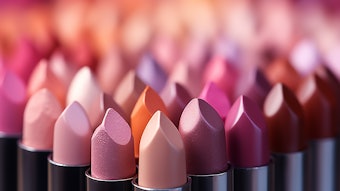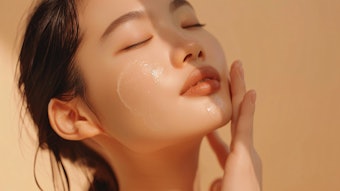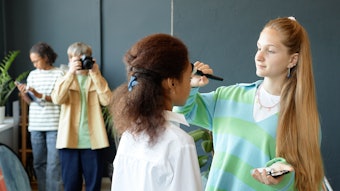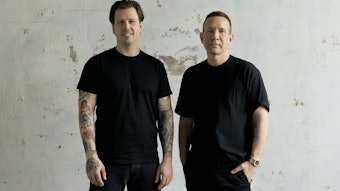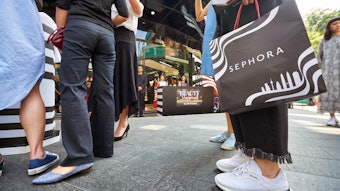Indian consumers have an affinity for products that utilize and market natural ingredients. That is what natural skin and hair care brand Lotus Herbal is focusing on with its Ecologique cosmetics range, which claims to be 100% vegetarian, 97% natural and is enriched with botanical extracts.
Talking about the market for nature-based makeup products, Nitin Passi, Lotus Herbals’ director of marketing and sales, says, “This segment of natural makeup has huge potential in the Indian market, and Lotus Herbals is prepared to grab it. We have found that Ecologique, our natural makeup brand, is growing very rapidly, and we have an aggressive and in-depth growth plan. We are focusing on educating more and more customers through our beauty advisors about the benefits of using natural makeup. We are working hard to increase makeup purchases in the limited decision-making category, and want women to think [about the] well-being of their skin before applying any product.”
In fact, makeup buyers are changing slowly; they are moving from being traditionalists to experimenting with new colors and formats of makeup products. That is one of the reasons why the Indian market is seeing a 24% growth year-on-year even through the tough financial situation that rocked the market globally.
Giving insight into the consumer psyche, Passi says, “Indian women know what suits them best. They try and test all new products. They change their look by season and occasion. Now, brides-to-be (a segment that invests heavily in buying good makeup) are asking for different makeup looks. They are no longer hesitant in trying new fresh looks, and are more experimental and ask for products that can make them look better.” He further adds that women in India are better informed than before due to exposure to trend reports in media, online reviews and expert tips. “However the purchase of makeup does not elicit the same buying behavior, because, for some it is still an impulse buy—but, slowly for many, buying makeup is becoming an important purchase decision.”
That is why Lotus Herbals thinks it is the right time to introduce a new category in the makeup market. It has launched lip colors that are infused with almond oil; kohl pencils that have eye-soothing camphor; and nail enamels that are acetone- , DBP- and toluene-free. Passi claims that, in part, this is the reason its Pure Colors for lips, Natural Kajal, Colourdew Nail Enamel and Hypnotica Eye Contour Definer products are doing brisk business.
In fact, it’s not just Lotus Herbals pushing this concept of natural ingredients in makeup; The Body Shop is also waxing eloquent on the benefits of marula oil for skin, which is the key natural ingredient in all of its makeup products. Talking about the pull that natural ingredients have for Indian consumers, The Body Shop India’s COO, Shriti Malhotra, says, “Besides the bright colors in the makeup, the young people who buy our products are also attracted by the fact that the colors have natural skin-loving ingredients. That is why we also find the foundation in our mineral makeup range doing very well.”
Most of the brands that are selling nature-based makeup have also been selling herbal or natural skin care products, and this has been another trend that is pushing this market—and why herbal and ayurvedic skin care brands such as Himalaya Herbals and Biotique are entering the makeup market with limited products that utilize natural ingredients.
Skin Care Market; Demand for Product Options Grow
With an expected compound annual growth rate of 19% through 2013, the overall skin care market in India will continue to grow as consumers mature and demand different types of skin care products. Professional skin care, notably, is a segment that will see steady growth as both men and women open up to going to skin care therapy centers and dermatologists for skin procedures and treatment products. Medispas that use and sell professional skin care products, in particular, will see growth. Skin-tightening, radiance-boosting and anti-tanning solutions remain big in the professional skin care segment. And women in India are now using targeted creams for blemishes, wrinkles, under-eye, glow and skin brightening.
Interestingly, anti-aging and skin-brightening products remain the hottest selling segments despite the controversy in the concept of skin whitening in India. Those skin care brands looking to stay away from the pressure of activists and women’s forums that are anti skin whitening are focusing on skin brightening rather than whitening. They are also releasing promotions that are designed to be educational about issues and product offerings. In the skin-brightening market, Indian men—who are fast growing in awareness—have become the target audience because women consumers are already a mature consumer segment for these products.
The teen market is also a skin care segment that will see major growth this year, and brands such as Clean and Clear, Garnier, Ponds and Dermalogica are creating major pushes to sell basic skin care ranges—including face washes, anti-blemish creams and spot reduction solutions.
In terms of specific consumer segments, the market has grown larger with tier three and rural areas becoming the new focus for many Indian brands—and these areas are where most basic skin care is being sold. In addition, brands have been working to create awareness about using the right skin care products in these regions. This effort is due, in part, because the tier three markets are expected to grow very quickly. These segments of India’s population aspire to emulate the lifestyle in cities and urban areas as technology companies move into these regions—offering higher income potential and influencing lifestyle changes.
Henkel India to Sell Hair Care Business
Henkel India—which is owned by Henkel AG, Germany, and Tamil Nadu Petro Product—and sells professional hair care and styling brand Schwarzkopf Professional—has announced its intentions to sell its hair care business. The announcement came after the company reported losses for the last three quarters. According to a statement released by the company, the decision to sell off the Schwarzkopf business was made so that the company can focus on its core business of selling laundry and home care products in order to ensure long-term viability. The managing director of Henkel India also resigned his post, leading to major speculation in the Indian marketplace.
Two leading Indian brand owners—Jyothy Labs and Emami Group—have taken steps to acquire Henkel India’s hair care business. However, the market has reacted very differently to Henkel’s move and Jyothy’s interest in the purchase. While Henkel’s shares have gone up, Jyothy’s have taken a beating as shareholders question whether the purchase of Schawrzkopf business will have a positive impact on Jyothy’s overall performance in the market.
P&G Upbeat About Indian Performance
From being a minor location for P&G, the Indian market is now among the top three for the global brand owner. The company has recently announced that it is looking for its next $1 billion from this market. It is now focusing on growing the scale of its business here. Currently, the company is very positive about the performance of its brands—notably Wella, Olay and Pantene. The positive response to P&G brands is clear in individual spend data, which shows sales of P&G products in India has grown.
In India, the company plans to expand the number of categories in which it operates— adding new products to existing categories and growing the size of its market. The company is on a drive to improve its distribution spread and offers products at various price points.
After the success of its Olay anti-aging products, P&G has launched Olay Natural White range to tap into the growing segment. It has already shown results, doubling P&G’s share in the segment. Further, the company has extended its professional hair care brand Wella into the consumer segment with the launch of its Wella Kolestint Hair color range for at-home hair coloring.
Priyanka Bhattacharya is a writer and journalist covering the beauty, health and wellness industries in India. She is the contributing beauty features writer for several leading Indian women’s magazines.



